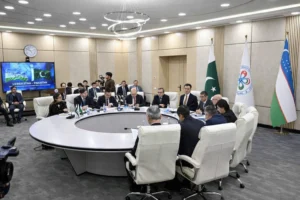President Mirziyoyev Reviews Proposals for Reforming Uzbekistan’s Vocational Education System

Tashkent, The Gulf Observer: President Shavkat Mirziyoyev reviewed proposals aimed at overhauling Uzbekistan’s vocational education system and reforming the national qualifications framework. This initiative follows a directive issued during a social sector meeting held earlier this year on February 5.
Currently, Uzbekistan’s vocational education system consists of 333 vocational schools, 227 technical schools, and 112 colleges. However, inefficiencies have arisen due to disconnected curricula and underutilized institutional capacity. To address this, it has been proposed to create a unified network of 600 technical schools by merging the three types of institutions. Through this optimization, 71 buildings will be repurposed for schools, creating an additional 42,000 student places.
Colleges are presently managed by various ministries and agencies, but the Ministry of Higher Education, Science, and Innovation will now oversee a unified state policy on vocational education, covering organizational, methodological, and management aspects. The proposal also calls for expanding the academic independence of technical schools to allow them to adapt more quickly to industry demands. Training programs will vary in length depending on the complexity of the profession and the educational background of the student.
In an effort to enhance the quality and attractiveness of vocational education, international programs will be introduced. The English-language BTEC program will be piloted in 14 technical schools, offering diplomas recognized in 70 countries and providing graduates with the opportunity to apply to more than 200 international universities. Based on the program’s success, it may be gradually expanded to other institutions.
The admissions process for vocational schools will also be reformed to align more closely with employer needs. A new electronic platform will connect ministries and industries, ensuring that technical school programs are developed in coordination with key business sectors and large employers.
The presentation also included discussions on the reform of the National Qualifications System, which has been the subject of limited progress in recent years. Despite some advancements, more than 1,000 working professions still lack updated standards, and many qualifications do not meet international benchmarks. To address these challenges, Prime Minister Abdulla Aripov will now lead the Republican Council for the Development of Professional Qualifications and Knowledge. The council will include 24 new industry-specific councils to guide sectoral reforms.
A new Institute for the Development of the National Qualifications System will be established under the Center for Educational Projects. The Institute will develop a revised National Qualifications Framework based on international best practices. Additionally, the classification of positions and professions will be updated, with 100 modern professions being added and outdated ones being removed.
During the presentation, President Mirziyoyev emphasized the importance of equipping technical schools with modern tools and training workers in line with current industry standards. He also highlighted the need to increase the share of practical classes to better prepare students for the demands of the workforce.


